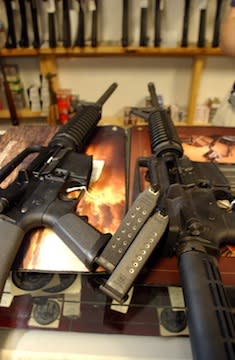 The Lookout
The LookoutWill Obama use executive action on guns?

Proponents of stricter gun control measures are pressuring President Barack Obama to sidestep Congress and act now to tighten the nation's controls on firearms.
Mayor Michael Bloomberg, one of the nation's leading proponents of stricter gun control, held a press conference on Monday, flanked by victims of gun violence and their families, to urge Obama to act.
"There are steps that the president can take on his own, right now, to address gun violence," Bloomberg said on Monday.
It's true that Obama, no longer worried about re-election, could take some action on guns without Congress, including pushing for more oversight of sellers and more thorough background checks for buyers. Obama hinted in a Sunday night prayer vigil with mourners in Newtown, Conn., that inaction will not be an option.
"I'll use whatever power this office holds to engage my fellow citizens in an effort aimed at preventing more tragedies like this, because what choice do we have?" he said.
In fact, after the shooting of Rep. Gabrielle Giffords in Tucson in 2011, Obama ordered the Justice Department to examine how the FBI's background check system, which is used in most gun sales to ensure felons or mentally ill people are not buying weapons, has more up-to-date information. Since then, the Justice Department has slightly beefed up the database by automatically adding federal crime information instead of waiting for prosecutors to manually input it.
But there are still huge holes in the database, including crucial information from other federal and state agencies about whether someone is mentally ill. After the 2007 Virginia Tech shooting, Congress called on these other agencies, including the Social Security Administration, to share this information. (The Virginia Tech shooter had been declared mentally ill by a state judge, but that information wasn't in the FBI database.) So far that hasn't happened, according to a New York Times report. (In the Newtown case, it's unclear whether a better FBI database would have helped, because the weapons used were reportedly registered to the shooter's mother.)
Bloomberg said Monday that with a "stroke of his pen," Obama could compel other agencies to share this information, bolstering the background checks that most gun buyers go through before obtaining weapons.

But Adam Winkler, a law professor at UCLA and an expert on gun laws, said it's unclear how much Obama can do about the database executively. Most likely, he said, the president has the power to compel states to give more information to the database and make the FBI more proactively gather data from some sources, but there could be privacy concerns and potential lawsuits that would freeze up action.
There's also the fact that about 40 percent of gun sales do not include a background check because of a massive loophole that lets private sellers dodge the background check requirement. Gun control advocates have been lobbying Congress for years to close this loophole.
"For any reform to be meaningful it means Congress has to sign on," Winkler says.
David Kopel, an adjunct law professor at at New York University and research director at the conservative think tank the Independence Institute, said Obama so far has not been as executively "aggressive" as President Bill Clinton was on gun control, but that he wouldn't be surprised if the president begins to pursue more executive action on the subject now.
In his first term, Obama required gun sellers in the four border states to report to the federal government if individuals buy more than one semi-automatic rifle in a short amount of time. Kopel says the president may try to expand that requirement to all 50 states, which would be sure to raise complaints that he was instituting a de-facto national gun registry.
Kopel also said Obama could try to classify certain guns as "destructive devices," a legal term for some weapons that are highly restricted by federal law. So, for example, Obama could administratively reclassify the AR-15, a semi-automatic rifle similar to the one used in the Newtown shooting, as a destructive device. Kopel thinks this would be a legally dubious move, however, which would most likely be challenged in the courts.
Past presidents, including George H.W. Bush and Clinton, have also placed strict barriers on imports of certain types of weapons, which have relaxed over the past 10 years. Obama could reinstate these import bans.
But most of the reforms coveted by Bloomberg and other gun control advocates—bans on certain rifles and pistols that automatically reload and high-capacity magazines that carry more than 10 bullets—would almost certainly have to go through Congress.
"I'm skeptical that much more can be done thorugh the administrative route," said Bob Cottrol, a professor of law at George Washington University.
And even if Congress signs on to these reforms, a 2008 landmark Supreme Court decision could end up being a roadblock. In the District of Columbia v. Heller, the Supreme Court ruled that lawmakers cannot ban an entire class of gun (in this case, handguns) that people commonly use for self defense. Kopel thinks this means any categorical ban (like one on assault weapons) will be suspect, because many of those weapons are very popular. (The AR-15 weapon is one of the most popular in the country.)
But Winkler contends that even if the weapons are popular, that they're used for hunting or to shoot at ranges for fun and not for self defense, such a ban would most likely pass constitutional muster. "These high-powered semi-automatic rifles are not self-defense weapons," Winkler said.
